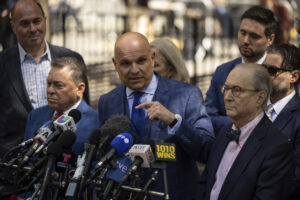Live Chat: Robert Scheer on Obama’s Call for Less Regulation
If you missed our live video chat, in which Robert Scheer discussed with readers his latest column, "Obama Pulls a Clinton," or you just want to relive the excitement, you can read the full transcript here. Update: Video
BLANKIn this live video Q & A session, Robert Scheer discussed with readers his latest column, “Obama Pulls a Clinton.” You can watch the video, listen to the podcast, and read the full transcript below.
VIDEOS
(transcript below) :
PART 1
PART 2
PART 3
PART 4
OK. Greetings, everyone. We’re here with Robert Scheer to talk about his latest column. How’re you doing, Robert Scheer?
Robert Scheer: Very good.
Anderson: And without further ado, let’s get going with the questions. How’s that?
Scheer: OK. This sounds very formal, but OK.
Anderson: Well, I can get more informal as the broadcast goes on. OK, first question is from Elliott: “I am a 30-year-old writer and yoga teacher in San Francisco. I was laid off from a major Wall Street money-manager in ’09, and have been following the narrative about the financial crisis. At this point, and particularly with Obama’s new call for less regulation, I’m inclined to believe the corporate state is so entrenched that it’s a little helpless. Could you provide, in your estimation, steps regular citizens can take to step up pressure on Washington to reinstate a firmer wall of separation between government regulators and corporations?”
Scheer: Well, ironically, John McCain and [Maria] Cantwell, the Democratic senator from Washington, had a very simple proposal when we were considering financial re-regulation, and that was: Restore Glass-Steagall. Put the wall…and this is really what the Volcker rule, if he took it seriously, would be all about — separate the high rollers of investment banking from the commercial banks that are supposed to be entrusted with the deposits of ordinary people, making mortgages to people. They have to exercise due diligence, and the deposits are federally insured. Now, we crossed that line with the reversal of Glass-Steagall, and then the banking bailout, which is really throwing money at Wall Street, by both Bush and Obama. We allowed these investment banks like Goldman Sachs to cross over and become bank holding companies, but with no real accountability. So I would say that some beefed-up Volcker rule, some sort of wall between investment and commercial banking, has to be done. And that is really a matter of tightening regulation — the opposite of what Obama called for in his Wall Street Journal column. The other thing is we have to do something about people who own houses. We have to have a clamp-down on mortgages. We have to have some kind of moratorium on foreclosures, because if you can’t get housing back, you can’t get consumption back, you can’t get jobs back. That’s the reality of it. We’ve done everything for the banks, but we haven’t…the government, the Fed, the Treasury hasn’t done, really, anything significant to help homeowners.
Anderson: OK. We have another question from Pete from Colorado. He says: “Hello Robert. Big fan of Truthdig. Read your book ‘The Great American Stickup.’ ” That should make you happy …
Scheer: Wow. It does.
Anderson: “ … Thanks for the who’s who of men who are destroying America because of the addiction to greed. I have a two-part question for you: Why do you think Americans are apathetic towards righting America’s wrongs? We need to make a stand against these despotic men, so how can we as citizens bring them to justice within our system?” It’s sort of an add-on to the last question …
Scheer: Well, the real big issue here is … first of all, it’s called a dismal science, economics, because it’s depressing enough to begin with. But what happened with the development of mathematical models — which really did not represent serious economic science, but represented a marketing gimmick assessing risk and so forth, which was at the heart of this whole securitization of debt — [it] put a layer of sort of phony or pseudo-science on top of everything, and it all becomes very intimidating. Yet we know from the testimony of the CEOs, they admitted they didn’t understand these products, they admit there was no real accountability, that it was too good to check as long as the money was flowing. But I think there’s one factor, which is that because of this very large number of PR people, lobbyists, some who now have been brought in — for instance, the two key lobbyists for Fannie Mae and for the banks were brought in to the key positions in the Obama administration. The chief lobbyist, [Thomas] Donilon, for Fannie Mae and the chief lobbyist for JPMorgan Chase, [William] Daley — Daley is now chief of staff. So the guys who were basically acting to disenfranchise the public, to make this stuff obscure, to lie about it, to prevent real regulation, who really specialize in confusing the public, preventing real information from getting out there, are now firmly entrenched in the government. Certainly [Timothy] Geithner, our treasury secretary, certainly others, Sperling and others, are in there. So it isn’t as if this stuff is intrinsically so complicated. It’s that the public is bamboozled by economists and public relations people and lawyers and others who are basically working for the banks, making enormous amounts of money. Daley, for instance, who’s the new chief of staff, got $5 million a year from JPMorgan, basically functioning to influence Congress to go easy on JPMorgan and the other banks.
So we’re really dealing with a situation where this is the opposite of what the founders had in mind. You know, yeoman farmers understanding the issues; the issues were local. In fact now it’s all…public policy is a plaything of the lobbyists. And so I don’t blame the public for not quite getting it. They’re also full with a lot of self-guilt: “You did it, you took the wrong loan, you signed the wrong paper. You made a mistake.” We specialize in that in this country; we blame the victim. “You should have read all 40 pages of it in fine print. You should have gotten a specialist to read it.” Nonsense! People had a right to think the bank extending the loan was extending a legal document. As I point out in my column, if you foreclose on a house and the people don’t want to get out, the bank doesn’t kick you out — they get a government agent, a cop, a sheriff, a marshall to kick you out. And so the government intervenes to enforce the contract; shouldn’t the government be involved in making sure the contract is a proper, legal, vetted document? That didn’t happen. And in fact, we now have 65 million mortgages that are owned by something called the MERS system in Reston, Va., the Mortgage Electronic Registration Systems, and we don’t even really know who owns these properties anymore, which is why the banks have gotten into some difficulty foreclosing. It’s an enormous mess, and no relief is really being given to homeowners who are beleaguered. It’s all been given to the banks; the banks’ quarterly report profits are outrageous, their bonuses are outrageous. Day after day now they’re being announced, and they’re having a banner year. And yet housing sucks. Housing is lower at the end of this year than it was at the end of last year. Anderson: OK. Well, going back to your column, we have a question from Truthdig member BarryDalton, who says: “Your column is fair in regards to the Clintons, but isn’t it too early to tell whether Obama is simply greasing the wheels for the next election without any real intention of weakening important regulations? Certainly there has to be one or two regulations that give a government worker something to do but aren’t particularly effective. He can have his political cake and eat it too.”
Scheer: Well, look. I hope I’m dead wrong on Obama. I mean, I voted for Obama; I actually made a financial contribution that at the moment I couldn’t afford, because I was afraid he might lose. And I would like nothing better than to be dead wrong on my assessment of this administration. Trust me. And I would say that even if it were a Republican administration. I want a happy ending. I’d like to think we can get out of this mess. I’d like to think we could solve the problems we have. You know, it doesn’t give me any great pleasure that there are 50 million Americans who have mortgages that are worth considerably less than the value of their house. It doesn’t make me feel better that millions of people are losing their homes, and when they lose their homes they have to pull their kids out of school, and their whole self-esteem, their whole sense of their life is destroyed. So, you know, I don’t like wallowing in despair. And I would love to wake up six months from now or two years from now and say, “God, I got Obama wrong.” I hope that happens.
However, I think the signs are very worrisome, because as I said in the column, Obama seems to be following the Clinton trick. And it’s working! The Wall Street Journal poll now shows he’s up to 54 percent popularity. He’s seen as a moderate. He’s going to probably get more money from Wall Street — he got quite a bit from Wall Street in the last election — and you know, he may get that second term. If it were just a question of getting rid of needless regulations…and, trust me, I’ve lived in this country for a long time; I know we have a lot of needless regulations. I’m not a fan of government bureaucracy; I have to go over to county and city buildings all the time and argue about this tax or this bill or what have you. I don’t live a life where I have agents who take care of that. And I don’t really … obviously we could get rid of all sorts of regulations. That’s not what they’re talking about. He didn’t come out with just, “Oh, let’s get rid of needless regulations.” He wrote a piece for the Wall Street Journal that was a white-flag column. It was throwing up his hands and saying “Tell me what to do.” And then he’s going to the Chamber of Commerce with the explicit message: “How can we cooperate? Tell us what to do.”
Here’s a Chamber of Commerce — deceitful crowd — that put money into the people, to win the Republicans who were demagogues in this midterm election, to finance them, blaming not Wall Street, blaming not the radical deregulation, but blaming the government and its faint-hearted efforts at regulation. And so the language is very similar to that Clinton employed: “We have to have a modern economy. We have to have regulations for the 21st century. We have to compete abroad,” et cetera, et cetera. And so he’s really talking about derailing the Consumer Protection Agency. I’m afraid he is. Maybe I’m wrong. I hope I am. One way we can make sure that I’m wrong is if we can mount letter-writing campaigns and e-mail campaigns, and people can say “Hey, we’re worried, President Obama. Don’t betray us on this.” That’s why I wrote the column: I’m trying to get people agitated about this so that they will do something.
But in the main, it’s not really a question of regulation. No one likes regulations, unless you happen to be some mindless bureaucrat who just wants to push people around. What we’re really talking about is anti-fraud. We’re talking about transparency. This word “regulation” gives the wrong impression. What you really want is to make sure when the banks put mortgages together, that they’re doing it in a transparent way. When they extend a loan, make sure that they’re following reasonable procedures of informing the consumers, that the language is clear, that people are not being deceived. So we’re really talking about anti-fraud rather than regulation. And that’s what was destroyed by the policies of Clinton, of George W. Bush; and the radical deregulation was really allowing these people to commit fraud and have it be legal. That’s what we’re really talking about: the collateralized debt obligations, the credit default swaps, to let AIG issue what they claim were insurance policies on these things and not put any money up to back it up. The incredible leveraging that went on, the deception in the writing of mortgages, the packaging people’s nest eggs, their security, their dream of retirement into some kind of security that they sold and resold and, you know, tranches and all this gibberish—which everybody now concedes. And that happened not because we had excessive regulation; it’s because we ended fraud prevention. That’s really what happened.
So what I’m hoping is that this Consumer Protection Agency, which is the only real thing to come out of Obama so far, will have some muscle. It looks like it’s going just the other way; the Republicans, elected with the help of the Chamber of Commerce and the House, are now going after Elizabeth Warren, they’re going after her agency, they’re threatening not to fund it. So this already weakened consumer protection is in danger of being wiped out, and clearly they’re trying to reverse even the small gains in regulation of the financial community that were pushed through in the last Congress.
Anderson: OK. Here’s kind of a to-the-point question from Sheila from Cottekill, N.Y. She asks: “How is it possible that so soon after a near collapse of our economy, the corporate interests are holding us hostage again? How can Obama be such a hypocrite and think we, the people who elected him, won’t see through his weakness for the corporate pandering it is?”
Scheer: Well, the problem is, money talks. You know, money can do a lot. We live in a society where we educate people, particularly the best and the brightest — the ones who go to the better schools, who get the better grades — to focus on their career, and not a career of serving, but rather a career of getting a lot of money. Or getting a lot of toys. That’s the standard of success; we de-emphasize ethical concerns. My god, as a teacher, when I bring up things that Jesus said — you know, the good Samaritan, notions of ethics, when we talk about what Scripture says about usury, about not taking advantage of your neighbor … . I asked my students last night in class, I said, “What’s the credit [card interest] — tell me, what are you paying?” and one kid said, “I’m paying 27 percent on my credit card.” From the school! With the football team on it. Oh, really? 27 percent? Well, I think Scripture, whether interpreted by a Muslim, a Jew, or a Christian, would find that to be usurious, a betrayal of the whole idea of not taking advantage of the vulnerable. But now, what we teach in the business schools, in the law schools, is basically: Rip off what you can. And money influences that in an extreme way. These people can offer…they’ve got the smartest, sharpest-talking people to be their publicity agents, their lawyers, their representatives. They can contribute to all the candidates.
And just think about it: the fellow who’s now chief of staff — Daley — for Obama, who really guards the door to this president, was making $5 million when the rest of the people were losing their homes? Working for JPMorgan that had these toxic assets? We’re not talking about ancient history; we’re talking about a year ago, and two years ago. He leaves with a $7 million payoff and we expect this guy to feel the pain of people out there? And I’m afraid that the talking heads on television, the pundits, these people get what, $75,000 for a speaking fee — very often from these same banks? Or from these trade associations and so forth? So we have … this is not the democracy of the founders. They thought the free press that they wanted to protect was, you know, anybody could do it. You have a pamphlet, you put up a wall poster, you speak, you’re the town crier. No! The media now is controlled by the very people who profit from these laws that allow swindling, and it’s amazing to me how much does get out, but it’s very little of what we need to know.
So, yes, I think they will get away with it. The only thing blocking them is reality, OK? That’s the thing blocking it. And Obama has to know that if this economy is still suffering in this way at the time of the next election, he’s going to be in trouble. No matter how many PR people you have, no matter how much money you have from Wall Street, you can’t fool people all of the time. And right now there’s kind of a feeling, “Maybe he saved us from the Great Depression; maybe there’s something that’s going to happen; maybe it’s going to loosen up.” I hope so! But if the numbers of the people who are long-term unemployed, if the housing market, if basic consumption is still down at the time of the election, then there will be a change. I’m afraid it might be a change for the worse, and these demagogues from the right might score some victories again.
Anderson: OK. Well, speaking of the right, we have a question from Gustavo, who asks: “Do you think this move toward deregulation of Wall Street is a move to soften up, or to avoid, the Republican opposition to projects such as health care reform?”
Scheer: Well, clearly, the rationalization for what Obama is doing is: “We have to steal the thunder of the conservatives” — the so-called conservatives, I don’t think they’re real conservatives — “who won in the midterm election and we have to show we’re pro-business, and we have to show we’re not wild socialists,” and all this. Which is the silliest thing in the world, given how conservative his health care plan is. I mean, if the health community — and by that I mean the people who profit from it — were at all logical about their long-term interests, they would embrace Obama’s reforms, so-called, because they don’t really control costs; they will not keep down profit; there is no public option. There really is no restraint on costs. This was based on what happened in Massachusetts, their proposal — which was a Republican proposal. Yet the very small steps that Obama has taken are branded as wild-eyed socialism and radicalism and so forth. They’re nothing of the sort. But I think clearly Obama’s strategy, which is the same as Clinton’s strategy, was to move to the right and to embrace these people. I think it’s a failing strategy. I think when Clinton did it, it ushered in this era of greed. I hold Clinton, the Clinton bubble, responsible for the fundamental changes … .
I know we’ll have a lot of readers, people who hear me on the radio, read the column, read me on Truthdig…some of our other Truthdig writers disagree quite bitterly with me. We go quite a range; we have people who are still very sympathetic to Clinton. I know when I work out at the athletic club, people give me a hard time: “Why are you so nasty about Clinton?” or “Why won’t you give Obama more slack?” And my gut feeling is to say “Sure!” I liked Clinton. I interviewed the guy when he was governor; I interviewed him after. I interviewed him after he was president. He’s very charming, and I certainly felt for him when he was under this vicious attack from the right wing and so forth, over the whole Monica thing. But the fact is, when I look at the record, and to the degree that I can be a scholar and be a serious reporter…that’s why I wrote the book, you know. I covered this stuff when I was a reporter for the Los Angeles Times; I saw it play out. And the reality is that Clinton bears as much responsibility as anyone — Reagan, George W. Bush, anyone — for the mess that we’re in. And he did it because he was trying to placate Wall Street. He listened to the Robert Rubins and the Lawrence Summerses, and all these people who said: “Give them what they want and they’ll be well-behaved.” Well, they weren’t well-behaved. And I’m just afraid that Obama’s moving down that path. Now, for people who want to prevent that: Open your eyes! Is that what he’s doing? Is he supporting Elizabeth Warren? Is he pushing for regulation? What’s happened to the Volcker rule? What’s going on with Congress? And let’s see. And as I’ve said all through this, I’d love to be proved wrong. Trust me, I’d love it. I would celebrate being wrong, OK? Anderson: Well, here’s someone who wants to challenge you a bit on your column, asking from the Web: “If Obama is ‘pulling a Clinton,’ I look forward to the record-breaking number of jobs that will undoubtedly be created, seeing how Bill had the absolute best job growth in U.S. history — and it’s not even close. (The jobs under Clinton are more than double those of Carter, who is our No. 2 best job-creating president).”
Scheer: Wow, you have very low expectations if you recall the Carter administration fondly, and Clinton…Carter I won’t even visit; that was a disaster in terms of our economy. I mean, the incredible inflation, the…don’t get me started on Carter. Again, a person I like personally, and I interviewed, and so forth. But on Clinton, what we had was what I call the Clinton bubble. He made a deal with the Devil, which I think was Alan Greenspan and the Fed, for cheap money. And it’s well documented. My book, “The Great American Stickup,” goes into it in considerable detail. Robert Reich, who was in that Cabinet, has written about it. He was secretary of labor. And basically, Clinton turned to Greenspan, and he turned to Robert Rubin, who had been the top guy at Goldman Sachs, and brought him in as Treasury secretary, and said, “What do I need to get Wall Street to be happy with us and to have a boom in the economy, and give us a bubble, and give us cheap money?” And they said, “We’ll give you cheap money if you will give us this radical deregulation.” And the [end of] New Deal restrictions, and so forth. And I’ll give you some figures here. For instance, when Clinton…we now have a higher –well, we have the largest number of people in poverty than we’ve ever had in our history. Of course, we have a larger population. But we have 44 million people, officially, living under the official poverty line. That means $20,400 for a family of four. As a percentage of the population, we’re right back where we were when Clinton came into office. So in terms of job creation, and dealing with poverty — no. It’s a bust. Because his radical deregulation — which should have been forewarned by the collapse of long-term capital management, and then we saw the Enron collapse, which had to do with the Enron loophole allowing Enron’s machinations, which was in the Commodity Futures Modernization Act that Clinton signed off on. I wish that the reader would just go Google the Commodity Futures…you don’t even have to read my book, although it’s all in there, OK? But if you don’t want to read my book, read the Commodity Futures Modernization Act. You can Google it. Titles 3 and 4 very specifically say that none of these financial derivatives — the things that have caused this incredible loss of jobs, incredible loss of value for American people, signed by Bill Clinton — Titles 3 and 4 say specifically: None of these financial derivatives, none of these new financial devices, the Devil that caused this, none of this will be subject to any existing regulation or any existing regulatory agency! In other words: a blank check for the derivatives that everyone now concedes are the root of all of this job loss, this incredible indebtedness which we have had to run up to bail out everybody, to have the stimulus and everything; the loss of tax dollars that’s driving all of these state governments crazy, whether they’re run by Republicans or Democrats, having to lay off firemen and teachers and everybody. And all of that came from this bubble that Clinton authorized, and empowered, with those specific pieces of legislation that he signed.
And so if you look back at the Clinton years as good years, then you’re not looking at the consequence of action. Bubbles always feel good when they’re blooming; it’s the downturn, and that’s what we’ve been experiencing. So, yes, Clinton was able to pump up the economy with cheap money, thanks to Alan Greenspan, which is the opposite of what happened to Jimmy Carter. Jimmy Carter had a terrible money situation, superinflation, the Fed was not cooperative. But Greenspan cooperated with Clinton, gave him his free ride, and as a result we have this enormous burden that will be a burden for decades to come, having to pay off these debts.
Anderson: OK. Well, believe it or not, we just have time for one more question. And it’s a future-forward question for you, Bob. Can you handle it?
Scheer: I can handle the question.
Anderson: OK. From Anne Garrison. She asks, “Why did you get so behind Obama in ’08, even as the investment banking industry bankrolled his campaign and it was so easy to see this coming? And what will you do in 2012?”
Scheer: Well, you know, the honest answer is I was a sucker. I wasn’t alone. First of all, I will say I happen to think it’s very important to have a non-white-male president, OK? I think this is a great achievement for American society. It broke an incredibly important barrier that needed to be broken. And I will say Obama is certainly not worse than his predecessors. I mean, in some ways he’s better. So, you know, I didn’t vote for Nixon and I didn’t vote for George W. Bush. I did vote for Clinton. But my vote for Obama is not the worst vote I have cast. Let me put that right out there. And there are positive things about this administration aside from the fact that we have broken this barrier, this racist barrier that dominated. So I think Obama, a lot of things he’s done in foreign policy…not all of them, obviously. He’s been a war president; he’s accelerated the war in Afghanistan. I thought, if you want to have a positive note, I thought his reception of the Chinese leader this week, [who] George W. Bush snubbed — they didn’t have a formal dinner — I think is opening to China, which was reciprocated by the Chinese conceding they have human rights problems. This was really quite an achievement in foreign policy for Obama this week. I think he’s restored America’s reputation in many ways around the world because he’s soft-spoken, he’s smart, he’s diplomatic. I think he has — you know, one of the reasons I get so upset with Obama is I think he obviously has great potential. If I thought this guy was some kind of dyed-in-the-wool reactionary, I wouldn’t be writing in this tone. My tone is one of disappointment. And when I say I was suckered, you know, I fell for too bright a view. And specifically, I ignored the fact that Obama turned his back on public financing. That was the big mistake for people like myself. I should have seen the danger right there. And when he announced that he was going to break with what was the most important, really, campaign finance reform that we’ve instituted — presidential candidates were accepting public financing, and he said no, and it turned out Wall Street was the major contributor to his campaign, not all of us folks hitting those buttons and sending our contribution on the computer. The handwriting was on the wall. And when he came in, he really put the smiling face on George W. Bush’s coddling of Wall Street, throwing money at Wall Street. And it’s been an enormous disappointment.
Now, you know, I never tell people that they should vote the way I tell them to vote. This is not my expertise. I try to concentrate on the issues; I try to concentrate on what I see developing. We have other people who write on Truthdig — Bill Boyarsky, who was the political editor for the Los Angeles Times, and a political reporter, I consider the best political reporter in the United States. And you know, I’d probably suggest, read Bill’s columns when you want to figure out who to vote for, rather than my own. We have other good writers on Truthdig. So I don’t feel, “At election time, vote the way I do.” That’s not my job as a columnist or as a thinker. I’ve been deceived plenty in life, and I’ll probably be deceived again, by candidates. And you do fall for the lesser evil. And if the Republicans put up some horrendous candidate in the next election, I’ll probably have to support Obama. If they put up somebody reasonable, that’s a different story. But, again, this is not my strength, telling people who to vote for. I think my strength is trying to be honest in my analysis, informed, follow the facts, follow the logic. And sadly enough — sadly enough, I say — my work has held up. Sadly enough, I turned out to have been right about my criticisms of presidents in the past, and they didn’t follow my advice, and a lot of damage occurred.
Anderson: Well, Obama has two more years to listen to you, so let’s hope he tunes in soon.
Scheer: Well, let’s hope he listens to our readers, and others, you know? Let’s help people get aroused. I mean, criticism is not intended to make people weaker; it’s to make them stronger. Obama needs to hear from people who are disappointed with his performance on the progressive side. He needs to hear from people who are losing their houses and haven’t gotten their jobs back, or are working for much lower wages. He needs to hear not just angry noises out there, but he needs informed criticism. You know, it’s interesting. Let me end on this: The Republican right really came out of Barry Goldwater’s campaign. And Barry Goldwater suffered an ignominious defeat by Lyndon Johnson—you know, what, two to one? And yet true conservatives…and Barry Goldwater was a principled, decent conservative; I didn’t agree with a lot of his stuff, but he was an honest man and a principled person. And the people who rallied around his message stuck to it. They didn’t sell out, and they demanded that subsequent candidates adhere to Barry Goldwater’s philosophy, to a considerable degree: smaller government, lower taxes, and so forth.
On the progressive side, we don’t do that. We didn’t follow that example. We sell out so easily, you know. We cared about stopping these needless wars that are getting lots of people killed and angering the world and wasting resources — the guy says “OK, I’ll escalate Afghanistan.” “OK, go ahead and escalate Afghanistan.” … And we accept it. We elect this guy because we think, you know, he gave a great speech saying he’s going to hold the bankers accountable. When he was running, he challenged the things that I said today about Clinton. He said in his Cooper Union speech — it’s in my book — when he was a candidate, about the need for regulation, about the mindless deregulation of the Clinton administration, you know, and then he betrays that. Well, why don’t progressives do what the conservatives do and say, “No! This is critical to what we’re all about.” Same thing happened on health care. Why did we accept that there would be no cost control, there would be no public option, no extension of Medicare? I mean, God, if he just had lowered the Medicare age down to 55, that would have been better health reform than what we’ve got now. But the progressive side collapses. And so I don’t think we’re doing him any favor; I certainly know we’re not doing the country a favor by betraying our principles. I happen to think they’re sound; I happen to think it’s the direction of progress. And so I don’t think abandoning logic and fact is good for the country or it’s good for Obama or anybody else.
Anderson: All right. Well, thanks so much for your time and your learned words, and we’ll look forward to more in the future, hopefully next week.
Scheer: And I’m glad you cheered up. [Laughter]
Anderson: All right. ’Bye, everyone.
Your support matters…Independent journalism is under threat and overshadowed by heavily funded mainstream media.
You can help level the playing field. Become a member.
Your tax-deductible contribution keeps us digging beneath the headlines to give you thought-provoking, investigative reporting and analysis that unearths what's really happening- without compromise.
Give today to support our courageous, independent journalists.





